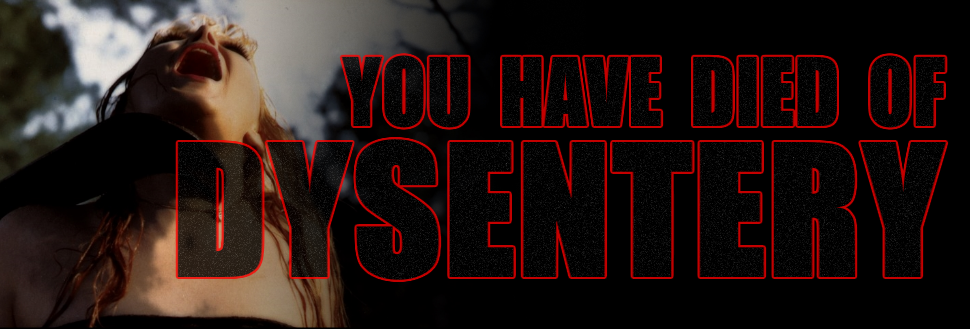FRIGHTMARE, a most
unfortunately titled film from British shock auteur Pete Walker,
is commonly referred to as an across-the-pond variation on THE TEXAS
CHAINSAW MASSACRE. Aside from the shared element of cannibalistic
families, nothing could be further from the truth. While Hooper's
film is a typical (though perfectly executed) exercise in hyperbolic
horror, Walker's film is a much more subtle and ultimately much more
intimately terrifying film. The Sawyer family of Hooper's rollicking
genre debut is essentially a geek show comprised of weird, physically
deformed and utterly batshit rednecks. The Yates family of FRIGHTMARE
is perfectly ordinary in appearance. They are simply, though in the
most extreme way possible, dysfunctional.
Dorothy and Edmund
are living in an isolated farmhouse after being released from a
mental institution where they served nearly two decades after being
found guilty of murder and cannibalism. They have two daughters.
Jackie, Edmund's daughter from a previous marriage, is a successful
young woman caring for her step-sister, Debbie, a young, rebellious
fifteen year old. Jackie is determined to shield her little sister
from the horrible history of their family but to little avail. The
bond between Debbie and Dorothy grows stronger, and as more and more
young women begin disappearing after visiting the Yates' family home,
Jackie begins to see in Debbie the tell-tale signs of her mother's
illness.
The characters on display here possess all the
faults of your typical After School Special family. Though Dorothy
Yates is a cannibal, she resembles in her behavior a common drug
addict or mentally ill individual. Supposedly cured of her condition,
she has begun a relapse of epic proportions, killing (and feeding) in
secret. Her long-suffering martyr of a husband, Edmund, desperately
wants to help his beloved wife but cannot bring himself to do so.
After all, that would mean a return trip to the mental institution
and their painful separation (it is later revealed that Edmund did
not partake in the red meat dinners, pleading guilty only so he could
remain by his wife's side in the institution).
Their two daughters
have been poisoned by their family history. Jackie has seemingly
taken the high road, having long since developed an identity apart
from her family, but is not willing to cut ties completely. She still
has hope for a normal family life with her parents. Debbie, Dorothy's
biological daughter, is more permanently damaged, her rebellious
nature owing more to genetics than simple displeasure at the course
her life has taken.
Without the elements of cannibalism,
this would be a routine family drama about how a mother's illness
poisons and erodes a family from within. Dorothy's reaction to
Jackie's inquiries about migraines and whether or not she has
"started again" is typical of the drug addict. Her reaction
is a mix of fury over being questioned and fear of being found out
(watching Sheila Keith work her way through every possible defense
mechanism is truly moving in a weird kind of way). Her husband's
reaction is quite different. Though he knows his wife is relapsing,
his reaction is to coddle her, to passively enable her to keep doing
what she is doing. This is a cycle of behavior that causes so many
families to collapse. It's not long before the fault lines turn to
fissures and things really start falling apart. Soon enough, Debbie
is being sought for murder, Jackie's psychologist love interest finds
himself trapped in the Yates home, and Jackie herself is targeted for
annihilation by her own family.
Walker's film is most
certainly depressing, but not because of the violence, though it is
plentiful, or the ending, though it is definitely an unhappy one. It
is because Walker does not provide any hope for anyone in the film.
These are the cycles of behavior that can and ultimately will destroy
the strongest institution in the history of human civilization, the
family. When it does move beyond the personal and into the realm of
social commentary, FRIGHTMARE, much like Kubrick's A CLOCKWORK
ORANGE, sets its sight squarely on the dual problem of a society
which can create monsters, but not effectively deal with them.
Of all Walker's
films, FRIGHTMARE feels the most complete and mature. While gruesome
at times, the film never feels exploitative. If anything, it feels
contemplative. The dissolution of a family has long been a go-to
narrative formula for tearjerkers and melodramas. The way Walker
mixes the more mainstream and subtle heartbreaks of those films with
what could be described (on the surface, at least) as a freak show
cannibal shocker is quite brilliant. It gives us an emotional core
for an anchor rather than allow us to tumble freely through the land
of shocking taboo.
And the film most
definitely has an emotion core. It's startling at time just how
melancholic this film can be. Though not without his own failings and
psychological faults, it's Edmund's pained words, "they said she
was well again...", that perfectly sums up FRIGHTMARE. With that
one line, we see everything. A family first destroyed then promised
better days only to spiral back down, the hope of a happy existence
wiped out by an unbreakable pathology, the tragedy of love poisoned
by illness. FRIGHTMARE might be unbearably intense at times, but it
is also wholly heartbreaking throughout.


No comments:
Post a Comment
SPEAK YOUR MIND